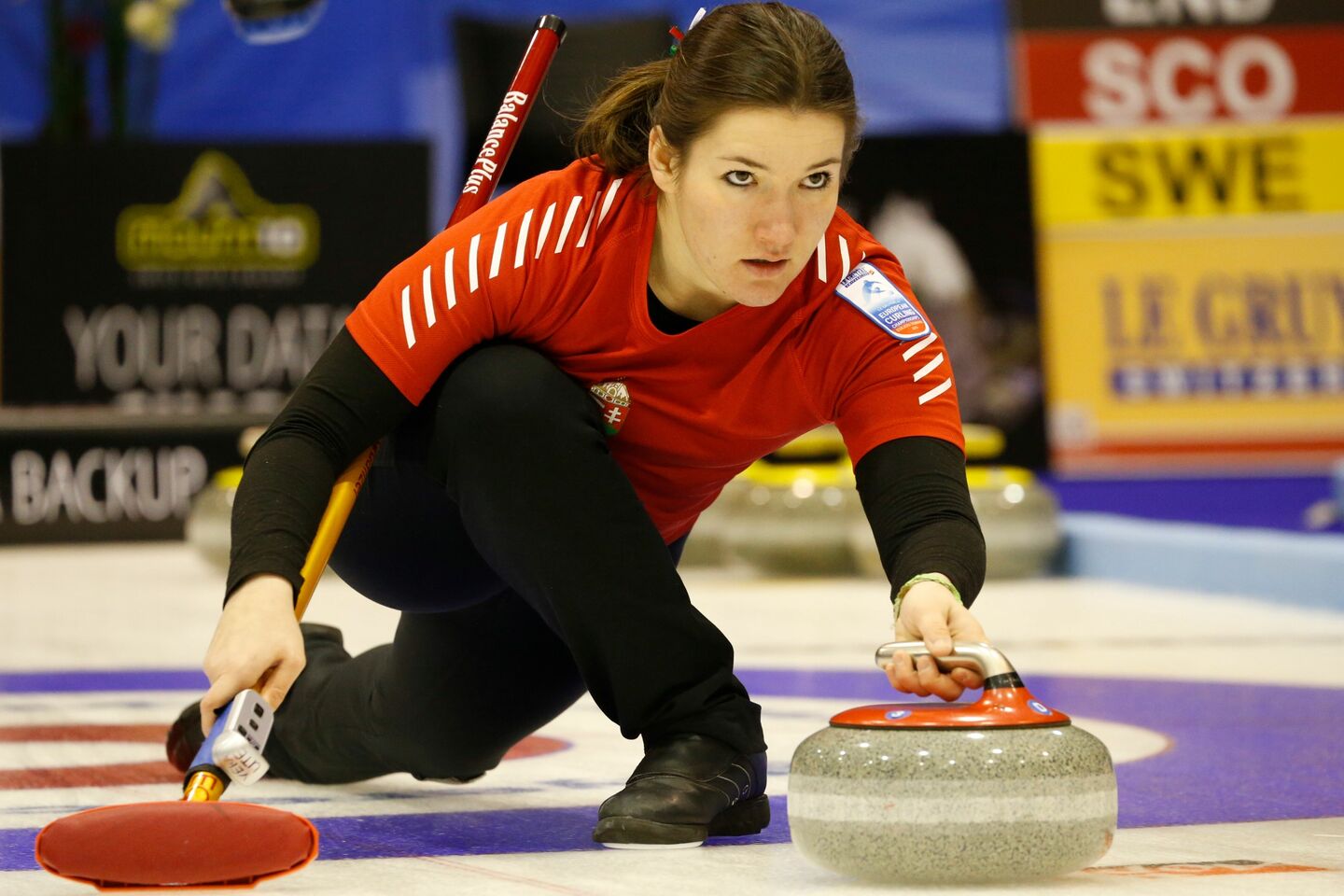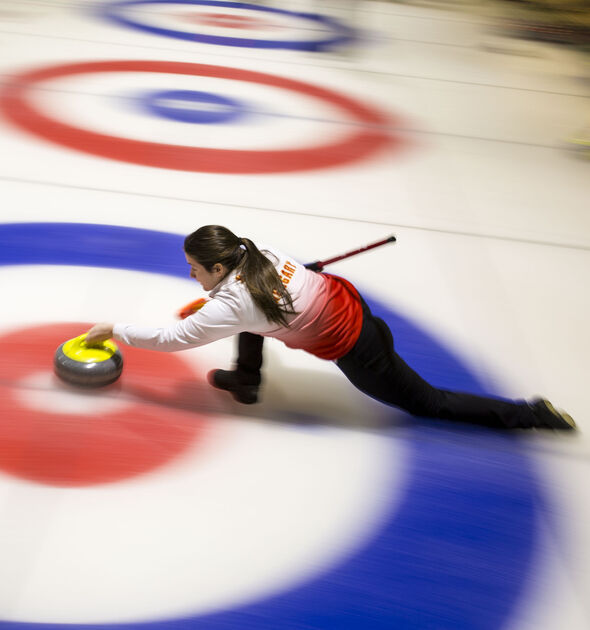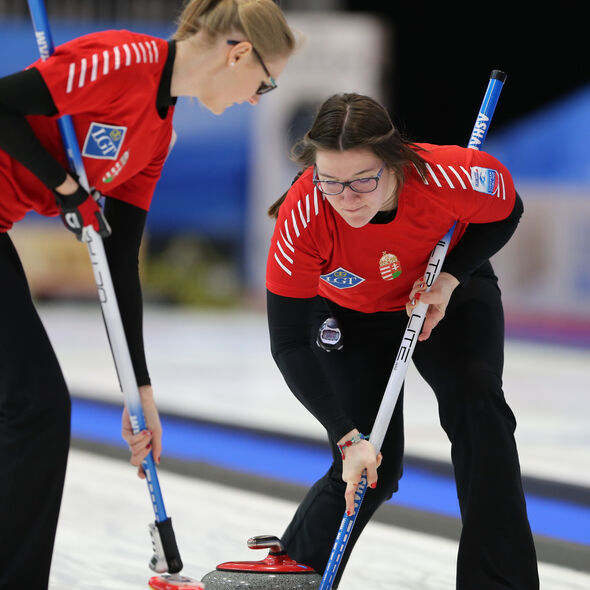
Vera plays 'chess on ice' with mathematical precision
While other students make the most of the afternoon peace and quiet in the SSC sports café to study, Vera Kalocsai is staring intently at her notebook and wearing ear plugs. She is watching a round robin curling match. “I had to see that. People I know are playing on both teams.” As soon as we're seated, the 23-year-old Hungarian student starts talking with the expertise of a professor of curling sciences. For an armchair athlete, curling is that Olympic sport with stones, brooms and a bull's eye. For Vera it is advanced geometry on ice; she doesn't think in centimeters, but in millimeters.
If Matt Damon wants to write a successful sequel to ‘Good Will Hunting’, he could consider ‘Good Vera Kalocsai’. The life story of a girl with a passion for math and complex situations who is forging a path for herself in the world of curling. “My grandfather taught me the fun side of discovering math. We used to spend hours together doing sums.” It has given her two curling qualities of inestimable value: mathematical precision and an analytical brain.
Vera Kalocsai | TU/e Master's student of Innovation Management | Curling | EC A-countries | Veldhoven | Budapest, Hungary| Elite athlete
“As a team you aren't necessarily concerned with each individual stone; you are making plans for the match as a whole. During training sessions we create all kinds of scenarios and are always asking the question: ‘What would you do now?’ For example, what would you do as a team with the last stone, the hammer, so that you could turn the 'end' [each team's 4x2 throws] around. That's why even in end 1 you are already thinking about the last stone in end 10.” A curling team makes its decisions in consultation with its skip, the team captain. “Our skip coaches largely by instinct, while I'm always examining everything in great detail. So we complement each other perfectly. For me, curling is chess on ice."
With this metaphor she succeeds in conveying both the power of curling and its limited popularity. After all, no one describes chess as ‘curling on a checkered board’. The sport is huge in Canada, has a healthy profile in the US, Scandinavian and Scotland, but is marginal in other countries. This has never deterred Vera. “A former classmate of my mother opened a curling rink near our home in 2005. At a reunion he invited everyone to come along and try the sport. My mother wasn't that interested, but it proved to be a hit with both me and my little brother.”
It was love at first sight. But as is true of any fledgling love, the shiny exterior doesn't tell the whole story. “I was only 10-years-old. After my first experience of curling, I thought it's not as easy as it looks. After playing for two hours, I discovered muscles I never knew I had. But I enjoyed it. I tried other activities like aerobics, but I'm simply not very girly. For the first three years I was the only girl in the group, which added to my motivation to improve my game.”
Although the curling scene on the Danube was growing steadily, Vera took her next step in the world of curling in the absolute Mecca: Canada. Via a member of the World Curling Federation, she received a scholarship at age 16 to Esquimalt High School in Victoria, home of the famous Greater Victorian Curling Academy. “It was like nothing I'd ever seen. The city had six clubs, each with more members than curling players in the whole of Hungary. My coach was Elaine Dagg-Jackson, the current coach of the Canadian national team. In seven months she transformed my entire experience of curling. It was no longer my sport, it became my elite sport.”
Canada offered everything Vera could wish for. Nonetheless after seven months she returned to Hungary. It was like returning to Earth from heaven. “My education has always been important to me and Hungary refused to recognize my Canadian courses. I'd have fallen too far behind if I had stayed any longer. Besides, I missed my team and didn't want to desert them. Fortunately Hungary then started taking curling more seriously.”
The team were given a coach and started doing strength training. “You see, in curling you have to be able to stay balanced for 2.5 hours, so we learned to be economic with our energy. With a sports psychologist, we learned to recover mentally within 60 seconds of throwing a poor stone. What I do is go to my happy place in my thoughts; a personal place that gives you peace. That's how I rid myself of my negative feelings and am able to quickly move on.”
Although Vera enjoys elite level sport and tournaments - “I really enjoy being in a bubble and working towards a single goal” - she enjoys 'stacking the brooms' just as much. “It's a real curling tradition. After a match you stack your broom by the hearth and enjoy a social get-together with your opponents. In Canada after the game the older players get together to tuck into food and drinks at the club. Sport takes a back seat. In thirty years' time, I can see myself playing curling recreationally like them. Broomstacking creates a true community among people who play curling; I now have friends worldwide.”
One of those friendships grew into a true romance. Vera now 'broomstacks' daily with the Dutch curling skip Jaap van Dorp. “We'd often come across each other and there was some chemistry, but it wasn't until 2015 that the spark ignited. At the time I was doing an Erasmus year at TU Delft. I knew he was studying there so I asked him for help, very casually like 'since you're here'. When he moved to Veldhoven to work for ASML, he invited me to join him for the carnival. I happened to be there with ESTIEM. Then the spark really ignited and we started living apart together,” she explains beaming.
Unfortunately a long-distance relationship can be tough to maintain, so Vera had to choose between the Hungarian team and Jaap. At Schiphol she had the same message for her coach as Will Hunting had for his ‘coach’: I gotta go see about a boy. “It was hard work combining my Master's with European tournaments; setting off on a Thursday evening and returning Monday. In Hungary you have semesters, but TU/e has quartiles - so even more exams! In addition, Jaap already had a job and his Dutch team has more opportunities both in terms of the sport and financially. After twelve years I knew I had to say goodbye to my team; and it broke my heart.”
For the time being Vera is training mainly solo at the Prins Willem Alexander Curling Club in Zoetermeer. “It's so strange. It really makes me miss my team. No feedback, no raising brooms, the sign of appreciation of a good shot.” Hopefully her curling isolation will be short-lived. “I am looking into whether I can play for the Netherlands. The Dutch women's team has got stuck in the B group and doesn't have that many players, so I am more than welcome." If she doesn't play any matches for two years, she can change national teams. A life without curling is inconceivable to her. “Everything is intertwined with curling, my relationship, my friends, my daily life. On the ice I'm at home, there are no problems.”
The sport has already given her so much. With Hungary she has won silver and bronze at the European Championships in the B group; in 2015 and 2017 she took part in the European Championships for A countries. “Curling has also helped me grow as a person. When I apply for jobs, I notice I'm seen as an interesting team player. Looking back, I am glad that we also had regular squabbles within the team,” she says with a smile. "What's more, I have travelled the world, made friendships for life with my teammates, and I've met my boyfriend: the most important person in my life.”
Still, the script of ‘Good Vera Kalocsai’ is far from complete; the National Championships are coming up, and the Olympic Games “are still a big dream” and the ideal career climax. Who knows, perhaps we'll see Vera Kalocsai representing the Netherlands at the Winter Olympics in Beijing 2022. And what about any children Vera and Jaap might have? “Jaap says our children don't have a choice; they'll be born with ‘curling DNA’ and will very likely start playing!”
If you'd like to know more about curling, you can email Vera.
Raymond Starke works at the TU/e Student Sports Centre, in the midst of more than 13 thousand sport card holders who frequently (or less frequently) do sports to their heart's content. Once every four weeks, he interviews a student or employee for Cursor on the topic of ‘the beauty and consolation of sports’.
Top photo: © WCF / Richard Gray



Discussion